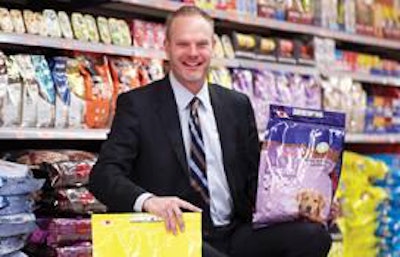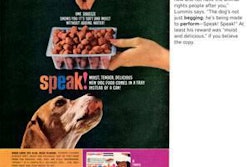
BiologÃa y Nutrición SAU's position as the sole petfood supplier and category manager for Mercadona, a supermarket chain with 1,325 stores and a 39% petfood market share in Spain, makes its need for a central location critical. Fortunately, the company has found that just outside Zaragoza, in a converted feed factory in El Burgo de Ebro. “Zaragoza is called the logistical heart of Spain,” says Roger Mohr, director of BYNSA, “because it’s only about 300 kilometers from all four major Spanish cities: Madrid, Barcelona, Bilbao and Valencia.” Keeping Mercadona’s petfood shelves continually stocked—efficiently and economically—is key to the chain’s and BYNSA’s success.
Thanks to the exclusive arrangement with Mercadona—which Mohr calls a “marriage” because the exclusivity goes both ways—BYNSA has grown dramatically in the four years Mohr has owned it, increasing its sales six-fold and its production five-fold from 20,000 to 100,000 tons a year.Â
The privately owned Mercadona established a business model in 1993 based on SPB: an abbreviation of the Spanish words for “always low prices.” All products it offers fall into the economy-priced category, many under the stores’ own labels; this is true for almost 80% of the petfood products. To keep prices low and quality high, including for its private-label products, Mercadona adopted the practice of having one exclusive supplier for each major category—what it calls buying directly from the source (see www.economist.com/node/18775460).
In 2007, the chain approached Mohr, who has more than 20 years’ experience in the petfood industry, to create an entity that would become its sole petfood supplier. After securing venture capital partners, Atitlan Capital, Mohr purchased BYNSA. (The company was founded 23 years ago by Juan Pardo and moved to El Burgo de Ebro in 2001.)
One of Mohr’s first steps was to hire two key petfood professionals—Gerardo Nieto as director of operations and Isabel Castellanos as director of quality and R&D—to help him evolve BYNSA into a top-class company and facility. “I’m very proud of the progress we’ve made in just four years,” Mohr says. “Our factory is not yet human grade, but we’re working toward that.”
“Through the end of this year, we will have invested 19.5 million Euro (US$28.1 million) since buying the company,” Mohr adds. “We expect to invest another 13 million Euro (US$18.7 million) by end of 2014.” Besides building new office space (with existing offices being converted into an employee locker room and cafeteria), those investments have gone toward instilling quality and safety into all aspects of the company’s operations and products.
BYNSA is ISO 9001 and ISO 14001 certified and is working toward British Retail Consortium certification. The facility’s state-of-the-art features include an odor control system (see sidebar) and a lab that analyzes all incoming raw materials for quality, moisture and nutrients. It also tests for Salmonella, dioxins and other contaminants weekly and GMOs every three months (Mercadona requires GMO-free products). In addition to its own products, the lab tests competitive products.
Three extruder lines feed finished products to seven packaging lines in a section of the plant that Mohr says “looks like Disneyland” because of its colorful activity and machinery. Nieto designed the packaging lines for ultimate flexibility, depending on product runs, and for maximum safety all lines run through X-ray machines, which Mohr believes is a first for the global petfood industry.
Three palletizers offer flexibility to build regular “Euro” pallets or half-size “Düsseldorf” pallets that better accommodate the supermarkets’ needs. BYNSA uses only plastic pallets, as Mercadona requires, because wood is susceptible to humidity and other conditions common in Spain. The warehouse’s FIFO (first in first out) setup is achieved through a mechanical system called Flow Rail for handling the two different sizes of pallets, based on one used by Coca-Cola in Switzerland, that requires no electricity or other energy source (another first for Spain, Mohr says).
The pallets hold packages of 18 different products—a total of 22 SKUs—produced by BYNSA under the Compy brand sold on Mercadona shelves. BYNSA also supplies 15 SKUs of snacks and treats to Mercadona under the Bobby and Lucy brands. Currently these are bought from other producers, fully audited for quality and traceability of their raw materials by Castellanos’ staff. The packaging itself is all plastic, some with foil, plus carrying handles on larger packages for convenience. They feature top sliders with hoods, so consumers can easily tell if the packages have been opened or tampered with.
Similarly, BYNSA’s veterinarian-developed formulations use only top-quality ingredients, Mohr says, such as MDM (mechanically deboned meat) fresh chicken delivered to the plant chilled, not frozen. Other ingredients come from the company’s relationship with its sole client, which allows BYNSA to obtain premium by-products, such as broken rice, at low cost from other Mercadona suppliers.
As a private label producer, BYNSA doesn’t have to spend on marketing, nor does Mercadona do any promotion, which helps both meet their high quality standards despite their products’ economy pricing. For example, a 20-kg bag (about 44 pounds) of Compy dog food retails for only 10 Euro (US$14.43) in Mercadona; an 800-gram bag (about 28 ounces) of premium cat food sells for only 2 Euro (US$2.89).
The global recession has significantly affected Spain, which is suffering 20% unemployment. That has forced retailers like Mercadona to keep its prices even more competitive, which can put financial pressure on its suppliers. Despite that, Mohr insists he will not compromise the quality of his products or their packaging. “That’s a short-term solution,” he says. “It’s not good for the long-term.” So he is researching export opportunities while continuing to invest in R&D and his facility. BYNSA’s production grew 21% last year, and Mohr expects a similar increase this year. “The goal is to build our capacity to 150,000 tons. We would then be producing one-third of Spain’s annual 350,000 tons of dry petfood,” he says. Not bad for only four years of work.


















